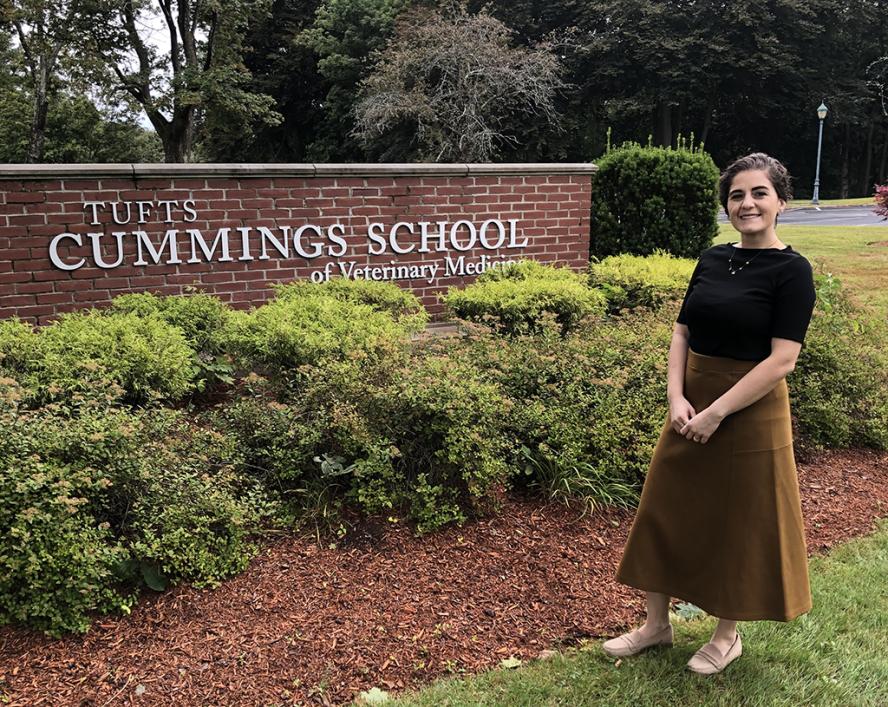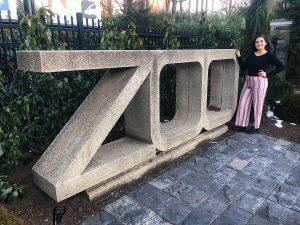-
About
- Leadership & Faculty
- News & Events
-
Academics
- Graduate
- Advanced Clinical Training
- Continuing Education
- Academic Departments
- Academic Offices
- Simulation Experiences
-
Student Life
- Offices
-
Research
-
Hospitals & Clinics
- Emergency Care
- Hospital Services
-
Community Outreach
- Volunteer
In Pursuit of Conservation
Elena Iacono’s, VG19, longstanding love of animals has guided her from childhood to her career

Growing up in Florida, Elena Iacono, VG19 spent much of her time outdoors and in the water, developing a passion for nature. From a young age, it was instilled in her that all life is precious. “When I was a toddler, my mom wouldn’t let us kill bugs.” She wouldn’t forget that lesson, becoming a vegetarian at the age of 10, “which was really hard on my Italian family,” she laughs.
Iacono’s childhood best friend was the family dog, a husky and black lab mix named Jewel. “I can still remember that moment of looking at her and thinking she was the coolest thing that ever existed,” she says. “It was just so inspiring to have that bond with an animal, and that is really what pushed me toward working with animals.”
In high school, Iacono began to think about a career as a veterinarian and started working as a veterinary technician assistant. She went on to study wildlife ecology and conservation with a pre-veterinary focus at the University of Florida, while still working as a veterinary technician in a clinic that saw wildlife and domestic animals.
“I spent a lot of my time nursing baby animals through the night between studying for exams,” Iacono explains. “So, that’s where I developed a passion and love for working with wildlife and through my studies.”
Still, after undergraduate school, Iacono wasn’t entirely sure what career path she wanted to take. Having spent much of her high school and college years in a clinical setting, she wanted to explore the research side of medicine, and came across conservation medicine and the Master of Science in Conservation Medicine Program (MCM) at Cummings School of Veterinary Medicine.
“It links together my two backgrounds, having been a vet tech for so long and then having a degree in wildlife ecology and conservation,” she says. “And the MCM program let me explore that combination.”
While in the MCM program, Iacono was given the opportunity to work with elephants in Washington, D.C., at the National Elephant Herpesvirus Laboratory (NEHL) at the Smithsonian’s National Zoo. There, she screened for EEHV, a devastating viral infection of elephants.
“I had a background in conservation genetics and molecular ecology from volunteer work in undergrad, so I was able to use the laboratory skills I learned from that at the NEHL, but with a totally different application,” Ianoco says. “It was an incredible experience, not only because the work is so important, but also because I had not ever experienced or thought to pursue working in a diagnostic laboratory. Being able to do so while focusing on a species that is so awe-inspiring was really wonderful.”
Iacono’s time in the nation’s capital inspired her to pursue an internship at Disney’s Animal Kingdom, working in animal endocrinology. “I thought, ‘I am never going to have another opportunity to do this,’” she explains. “I ended up moving to Orlando while I was finishing my master’s degree. Since I was doing a written case study for the program, I was able to work at the same time.”
“And that internship completely solidified everything that I had started feeling in MCM,” she continued. “I was able to find myself and my confidence as a future conservation scientist.”
Following her hands-on experiences in the MCM program and at Animal Kingdom, Iacono applied and was admitted to a doctoral program at Texas A&M University for ecology and evolutionary biology. “I hope to drive population-level impacts with a basis in conservation, and I think that’s something that really inspired me to get into the academic side of medicine and go into a doctoral program.”
Throughout her journey, Iacono has struggled with imposter syndrome as well as anxiety. “I think a lot of people in professional fields, especially women, experience that,” she says. “It was a huge struggle for me, deciding to study the sciences because, even though I loved animals and I had wanted to be a veterinarian since I was young, it was not really my natural ability.”
But, with the support of peers and faculty members, Iacono has been able to persevere. “I always feel like we have to take a personal stake and a personal responsibility in anything that we really believe in. And so, that has motivated me, even when it’s been hard.”
The pandemic has been one of those hard times. While she has felt the effects of COVID-19, Iacono also recognizes much of what she has learned over the course of her education in the situation.
“It’s the living proof of how important One Health is and how important it is to understand and respect the connection between wildlife, the environment, and humans,” she says. “It makes me even more passionate about the field.”
As for her own future, Iacono is still working out the details. Beyond achieving her doctoral degree, she hopes to do something that involves answering questions about animal health, especially how it is impacted by anthropogenic change or influence, while driving population-level impacts and ensuring that her work has a solutions-driven focus.
“I’ve always been inspired by the intricate connections in the natural world and between human and animals,” she says. “And, I feel like it’s something that could never be replaced so I want to do everything I can to conserve it.”
Department:
M.S. in Conservation Medicine
